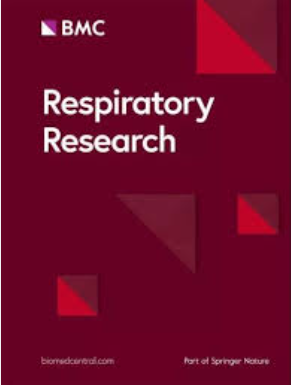Positive effect of deep diaphragmatic breathing training on gastroesophageal reflux-induced chronic cough: a clinical randomized controlled study
IF 4.7
2区 医学
Q1 RESPIRATORY SYSTEM
引用次数: 0
Abstract
To explore the efficacy of deep diaphragmatic breathing training (DEP) in patients with gastroesophageal reflux-induced chronic cough (GERC). A randomized controlled study was conducted involving 60 GERC patients who were divided into the intervention group and the control group (each with 30 patients). Both groups received routine medication treatment for GERC, while the intervention group received DEP training additionally. Both groups were evaluated by cough symptom scores, Hull airway reflux questionnaire (HARQ), gastroesophageal reflux diagnostic questionnaire (GerdQ), generalized anxiety disorder scale-7 (GAD-7), patient health questionnaire-9 (PHQ-9), Pittsburgh sleep quality index (PSQI), the Leicester cough questionnaire (LCQ), as well as capsaicin cough sensitivity testing, B-ultrasound and surface electromyography (sEMG) of the diaphragmatic muscles before and after treatment. The cough resolution rate and changes of the above indictors was compared between the two groups after eight weeks of treatment. After eight weeks of treatment, cough symptoms improved in both groups, but the cough resolution rate in the intervention group of 94% was significantly higher than that in the control group of 77% (χ2 = 6.402, P = 0.041). The intervention group showed significant improvements to the control group in GerdQ (6.13(0.35) VS 6.57(0.77)), GAD-7 (0(0;1) VS 1(0;3)), PSQI (2(1;3) VS 4(3;6)), LCQ (17.19(1.56) VS 15.88(1.92)) and PHQ-9 (0(0;0) VS 0(0;3)) after treatment. Compared to control group, sEMG activity of the diaphragmatic muscle was significantly increased in the intervention group after treatment, measured during DEP (79.00(2.49) VS 74.65 (1.93)) and quiet breathing (72.73 (1.96) VS 67.15 (2.48)). DEP training can improve cough symptoms as an adjunctive treatment in GERC patients. The protocol was registered in February 2, 2022 via the Chinese Clinical Trials Register ( http://www.chictr.org.cn/ ) [ChiCTR2200056246].深隔膜呼吸训练对胃食管反流引起的慢性咳嗽的积极影响:一项临床随机对照研究
目的:探讨横膈膜深呼吸训练(DEP)对胃食管反流引起的慢性咳嗽(GERC)患者的疗效。研究采用随机对照方法,将 60 名胃食管反流性慢性咳嗽患者分为干预组和对照组(各 30 人)。两组患者均接受常规的 GERC 药物治疗,干预组则额外接受 DEP 训练。两组患者均通过咳嗽症状评分、赫尔气道反流问卷(HARQ)、胃食管反流诊断问卷(GerdQ)、广泛性焦虑症量表-7(GAD-7)、患者健康问卷-9(PHQ-9)进行评估、治疗前后还进行了匹兹堡睡眠质量指数(PSQI)、莱斯特咳嗽问卷(LCQ)以及辣椒素咳嗽敏感性测试、B 超和膈肌表面肌电图(sEMG)。治疗八周后,比较了两组患者的咳嗽缓解率和上述指标的变化。治疗八周后,两组的咳嗽症状均有所改善,但干预组的咳嗽缓解率为 94%,明显高于对照组的 77%(χ2 = 6.402,P = 0.041)。干预组在 GerdQ (6.13(0.35) VS 6.57(0.77))、GAD-7 (0(0;1) VS 1(0;3))、PSQI (2(1;3) VS 4(3;6))、LCQ (17.19(1.56) VS 15.88(1.92))和 PHQ-9 (0(0;0) VS 0(0;3))方面均有明显改善。与对照组相比,干预组治疗后在 DEP(79.00(2.49) VS 74.65(1.93))和安静呼吸(72.73(1.96) VS 67.15(2.48))时测量的膈肌 sEMG 活动明显增加。作为 GERC 患者的辅助治疗手段,DEP 训练可改善咳嗽症状。该方案于2022年2月2日在中国临床试验注册中心( http://www.chictr.org.cn/ )注册[ChiCTR2200056246]。
本文章由计算机程序翻译,如有差异,请以英文原文为准。
求助全文
约1分钟内获得全文
求助全文
来源期刊

Respiratory Research
医学-呼吸系统
自引率
1.70%
发文量
314
期刊介绍:
Respiratory Research publishes high-quality clinical and basic research, review and commentary articles on all aspects of respiratory medicine and related diseases.
As the leading fully open access journal in the field, Respiratory Research provides an essential resource for pulmonologists, allergists, immunologists and other physicians, researchers, healthcare workers and medical students with worldwide dissemination of articles resulting in high visibility and generating international discussion.
Topics of specific interest include asthma, chronic obstructive pulmonary disease, cystic fibrosis, genetics, infectious diseases, interstitial lung diseases, lung development, lung tumors, occupational and environmental factors, pulmonary circulation, pulmonary pharmacology and therapeutics, respiratory immunology, respiratory physiology, and sleep-related respiratory problems.
 求助内容:
求助内容: 应助结果提醒方式:
应助结果提醒方式:


